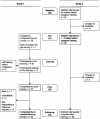Improving care quality and preventing maltreatment in institutional care - a feasibility study with caregivers
- PMID: 26236248
- PMCID: PMC4501176
- DOI: 10.3389/fpsyg.2015.00937
Improving care quality and preventing maltreatment in institutional care - a feasibility study with caregivers
Abstract
Institutionalized children in low-income countries often face maltreatment and inadequate caregiving. In addition to prior traumatization and other childhood adversities in the family of origin, abuse and neglect in institutional care are linked to various mental health problems. By providing a manualized training workshop for caregivers, we aimed at improving care quality and preventing maltreatment in institutional care. In Study 1, 29 participating caregivers rated feasibility and efficacy of the training immediately before, directly after, and 3 months following the training workshop. The results showed high demand, good feasibility, high motivation, and acceptance of caregivers. They reported improvements in caregiver-child relationships, as well as in the children's behavior. Study 2 assessed exposure to maltreatment and the mental health of 28 orphans living in one institution in which all caregivers had been trained. The children were interviewed 20 months before, 1 month before, and 3 months after the training. Children reported a decrease in physical maltreatment and assessments showed a decrease in mental health problems. Our approach seems feasible under challenging circumstances and provides first hints for its efficacy. These promising findings call for further studies testing the efficacy and sustainability of this maltreatment prevention approach.
Keywords: Sub-Saharan Africa; attachment; care quality; child maltreatment; institutional care; mental health; orphans; violence.
Figures
Similar articles
-
Preventing maltreatment in institutional care: A cluster-randomized controlled trial in East Africa.Prev Med Rep. 2021 Oct 9;24:101593. doi: 10.1016/j.pmedr.2021.101593. eCollection 2021 Dec. Prev Med Rep. 2021. PMID: 34976652 Free PMC article.
-
Maltreatment and mental health in institutional care--comparing early and late institutionalized children in Tanzania.Infant Ment Health J. 2014 Mar-Apr;35(2):102-10. doi: 10.1002/imhj.21440. Epub 2014 Jan 28. Infant Ment Health J. 2014. PMID: 25798516
-
Neglect and perceived stigmatization impact psychological distress of orphans in Tanzania.Eur J Psychotraumatol. 2015 Nov 19;6:28617. doi: 10.3402/ejpt.v6.28617. eCollection 2015. Eur J Psychotraumatol. 2015. PMID: 26589257 Free PMC article.
-
Characteristics, Classification, and Prevention of Child Maltreatment Fatalities.Mil Med. 2017 Jan;182(1):e1551-e1557. doi: 10.7205/MILMED-D-16-00039. Mil Med. 2017. PMID: 28051972 Review.
-
Child Abuse and Neglect and its Psycho-Physical and Social Consequences: A Review of the Literature.Curr Pediatr Rev. 2016;12(4):301-310. doi: 10.2174/1573396312666160914193357. Curr Pediatr Rev. 2016. PMID: 27634538 Review.
Cited by
-
Salivary Oxytocin Concentration Changes during a Group Drumming Intervention for Maltreated School Children.Brain Sci. 2017 Nov 16;7(11):152. doi: 10.3390/brainsci7110152. Brain Sci. 2017. PMID: 29144396 Free PMC article.
-
Reducing Violent Discipline by Teachers: a Matched Cluster-Randomized Controlled Trial in Tanzanian Public Primary Schools.Prev Sci. 2023 Jul;24(5):999-1010. doi: 10.1007/s11121-023-01550-0. Epub 2023 May 26. Prev Sci. 2023. PMID: 37233888 Free PMC article. Clinical Trial.
-
Reducing violence by teachers using the preventative intervention Interaction Competencies with Children for Teachers (ICC-T): A cluster randomized controlled trial at public secondary schools in Tanzania.PLoS One. 2018 Aug 15;13(8):e0201362. doi: 10.1371/journal.pone.0201362. eCollection 2018. PLoS One. 2018. PMID: 30110358 Free PMC article. Clinical Trial.
-
Preventing maltreatment in institutional care: A cluster-randomized controlled trial in East Africa.Prev Med Rep. 2021 Oct 9;24:101593. doi: 10.1016/j.pmedr.2021.101593. eCollection 2021 Dec. Prev Med Rep. 2021. PMID: 34976652 Free PMC article.
-
Reducing violent discipline by teachers using Interaction Competencies with Children for Teachers (ICC-T): study protocol for a matched cluster randomized controlled trial in Tanzanian public primary schools.Trials. 2020 Jan 2;21(1):4. doi: 10.1186/s13063-019-3828-z. Trials. 2020. PMID: 31898516 Free PMC article. Clinical Trial.
References
-
- Berument S. K. (2013). Environmental enrichment and caregiver training to support the development of birth to 6-years-olds in Turkish orphanages. Infant Ment. Health J. 34 189–201. 10.1002/imhj.21380 - DOI
-
- Borritz M., Rugulies R., Christensen K. B., Villadsen E., Kristensen T. S. (2006). Burnout as a predictor of self-reported sickness absence among human service workers: prospective findings from three year follow up of the PUMA study. Occup. Environ. Med. 63 98–106. 10.1136/oem.2004.019364 - DOI - PMC - PubMed
LinkOut - more resources
Full Text Sources
Other Literature Sources
Miscellaneous



